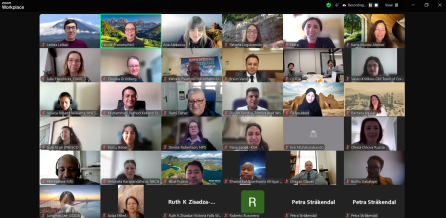From 17 to 28 March 2025, the international course ‘Managing World Heritage: People Nature Culture’ (PNC25) brought together 38 heritage professionals from around the world involved with the management of cultural, natural and mixed World Heritage sites.
Organized by ICCROM and IUCN through the World Heritage Leadership Programme, and supported by the Korea Heritage Service and the Norwegian Ministry of Climate and Environment, PNC25 addressed pressing issues of establishing strong management systems for World Heritage management.
Delivered online as a hybrid course, the course applies a blended learning approach with foundational theoretical resources provided through the ICCROM Learning Platform (to be launched later this year) as self-paced learning materials, and interactive thematic live sessions designed to apply the knowledge gained through exercises, experience sharing and discussions. This interactive element of the course reinforced collaboration across disciplines and regions, contributing to building a global network of World Heritage practitioners.
Participants represented a diverse range of heritage professionals, including site managers, decision-makers, planners and members of heritage institutions, from a wide range of heritage places–protected areas, historic towns, archaeological sites, cultural landscapes, geological sites, modern heritage–each bringing valuable on-the-ground experiences and perspectives to strengthen World Heritage management.
The course focuses on guiding participants through understanding, assessing and improving World Heritage management systems based on a 'heritage place approach' focused on understanding how to manage and conserve the multiple heritage values of places in their wider social, environmental and economic contexts. In the course, participants gained knowledge and skills to look at their heritage places and reflect on what is working well and what needs improvement, setting the basis for good and informed management planning processes.
Participants were introduced to key tools and frameworks such as the upcoming World Heritage Resource Manual ‘Managing World Heritage’ and the ‘Enhancing Our Heritage Toolkit 2.0’.

